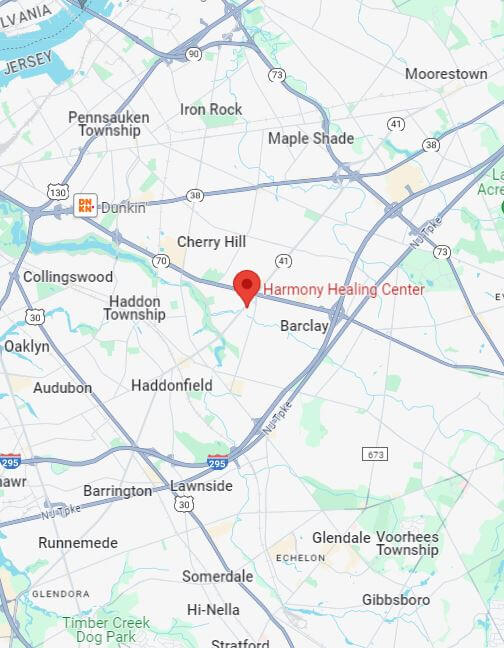At Harmony Healing Center in Cherry Hill, NJ, we are a certified cocaine addiction recovery center in New Jersey. We offer holistic cocaine addiction recovery programs designed to address the multiple facets of addiction. Our comprehensive approach aims to support and guide you on your journey to recovery, ensuring personalized care and effective treatment.
At Harmony Healing, our cocaine addiction rehabilitation treatment programs include medically supervised detox, intensive outpatient programs (IOP), partial hospitalization programs (PHP), and general outpatient services. These programs are designed to support patients in their recovery journey from cocaine addiction. If you or a loved one struggles with cocaine dependence, contact us to discuss which treatment program best meets your needs to achieve recovery from cocaine addiction.
Cocaine Use Disorder (CUD): Learning More About the Challenges of Cocaine Abuse
Cocaine use disorder (CUD) presents significant challenges, including severe physical, psychological, and social issues. Characterized by a compulsive need to use cocaine despite adverse consequences, CUD often leads to increased tolerance, withdrawal symptoms, and persistent cravings. Early cocaine addiction intervention is crucial to address this powerful addiction effectively.
The challenges of overcoming CUD are multifaceted. Individuals may experience intense cravings, anxiety, and depression during withdrawal. Social and environmental factors, such as peer pressure and accessibility, further complicate recovery. Effective treatment typically involves a combination of medically supervised detox, behavioral therapy, and cocaine addiction support groups to understand the physical and psychological aspects of addiction. Understanding the complexities of CUD is essential for providing the necessary support and resources for recovery.
What Are Street Names / Slang for Cocaine?
Street names and slang for cocaine are often used to disguise the drug in conversation. Standard terms include coke, blow, snow, flake, and powder. Other popular slang terms are rock when referring to crack cocaine, as well as white, nose candy, and toot. These terms can vary by region and subculture, but they all refer to the same substance.
Understanding these street names is essential for recognizing potential drug use and facilitating communication about substance abuse. In addition to the more common terms, less frequently heard slang includes yeyo, marching powder, and pearl. Being aware of this language can help in identifying and addressing cocaine-related issues in various contexts, including medical, law enforcement, and educational settings.
What Is a New Jersey Cocaine Addiction Treatment Program?
A New Jersey substance addiction recovery program helps patients overcome cocaine dependency through comprehensive care. It includes medically supervised detox, intensive outpatient programs (IOP), partial hospitalization programs (PHP), behavioral therapy, cocaine addiction counseling, and support groups, addressing both the physical and psychological aspects of addiction.
Statistics show that cocaine use remains a significant issue in New Jersey, with a notable number of patients seeking treatment for cocaine addiction each year. Effective treatment programs focus on the patient’s physical and mental health, providing a holistic recovery approach. By examining the underlying reasons for addiction and offering continuous support, these drug recovery programs aim to achieve long-term sobriety and improve overall well-being.
To learn more about the cocaine rehab admissions process, contact Harmony Healing.

Harmony Health Center – Cherry Hill, New Jersey
401 Kings Highway South
Building #1 Tara Corporate Park
Cherry Hill, NJ 08034
Finding Cocaine Addiction Programs That Offer CUD Treatment in New Jersey
Finding cocaine addiction programs that offer CUD treatment in New Jersey involves looking for facilities that provide comprehensive care, such as medically supervised detox, outpatient programs, and behavioral therapy. Harmony Healing Drug and Alcohol Addiction Treatment Center, located at 401 Kings Highway S, Cherry Hill, NJ 08034, offers such programs to give patients cocaine addiction support.
At Harmony Healing Alcohol and Drug Addiction Treatment Center, we specialize in treating cocaine use disorder (CUD) through personalized care plans tailored to each patient’s needs. Our programs include intensive outpatient programs (IOP), partial hospitalization programs (PHP), and support groups, ensuring a holistic approach to recovery. We accept insurance to make treatment accessible to more patients. Contact us at Harmony Healing Center or our caring team for more information.
How to Find a Cocaine Addiction Rehab Facility in New Jersey
What Are the Different Types of Cocaine Rehab Programs in the Garden State?
In the Garden State, various types of cocaine rehab programs cater to different needs and preferences. These include inpatient programs for cocaine addiction, providing intensive, residential treatment, and outpatient programs like intensive outpatient programs (IOP) and partial hospitalization programs (PHP), offering more flexible options for recovery support. Each program type addresses cocaine addiction through tailored therapies and structured support systems.
Residential Program for Cocaine Treatment in NJ
NJ PHPs for Cocaine Rehab
NJ IOPs for Cocaine Treatment
Cocaine Medical Detox

Contact Us for a Free Assessment
Are you ready to turn the page and begin a new chapter in your story? We have the tools you need to transform your life. Let’s talk about what’s next.

What Are the Different Types of Cocaine Addiction Treatment Medications Available?
Cocaine addiction medications play a crucial role in managing withdrawal symptoms, reducing cravings, and supporting long-term recovery efforts. It’s important to note that medication choices are individualized based on aspects such as the patient’s health, medical history, and needs related to addiction severity and co-occurring conditions.
Methadone is an opioid agonist primarily used in the treatment of opioid addiction but is occasionally considered for cocaine addiction treatment. It targets the same brain receptors as cocaine, thereby reducing withdrawal symptoms and cravings. Methadone maintenance therapy may help stabilize patients and minimize the risk of relapse, particularly in those with severe addiction.
Buprenorphine (Suboxone), a partial opioid agonist, is another medication used in addiction treatment. It works similarly to methadone but with a lower risk of abuse and overdose. Suboxone helps control withdrawal symptoms and reduce cravings, making it beneficial during the early stages of recovery. Its combination with naloxone helps deter misuse.
Naltrexone, an opioid antagonist, blocks the effects of opioids and can also be used in cocaine addiction treatment. By reducing the rewarding effects of cocaine, naltrexone can help decrease cravings and prevent relapse. It’s particularly effective in patients motivated to maintain sobriety as part of a treatment plan.
These medications are typically integrated into a broader treatment approach that includes behavioral therapies such as cognitive behavioral therapy (CBT), contingency management, and support groups like Narcotics Anonymous (NA) or Cocaine Anonymous (CA). This combination of medications and therapies treats the physical and psychological facets of addiction, enhancing the likelihood of sustained recovery. Treatment plans are created for every patient’s unique circumstances and progress, ensuring the most effective and supportive path to overcoming cocaine addiction.
Does Private Health Insurance Cover Cocaine Addiction Treatment in NJ?
Private health insurance coverage for cocaine addiction treatment in New Jersey depends on the policy and provider. Many plans deliver coverage for addiction treatment, including detoxification, residential rehab, outpatient programs, and medications necessary for recovery. The extent of coverage, such as copayments, deductibles, and limits on the number of days or sessions covered, can vary.
Patients seeking treatment should contact their insurance provider directly to verify coverage details and understand any out-of-pocket expenses they may incur. It’s advisable to inquire about in-network providers, as choosing a facility within the network can often reduce costs. Some plans may require pre-authorization for certain types of treatment, so patients should be proactive in understanding and meeting these requirements to maximize their insurance benefits for cocaine addiction treatment. Contact us at Harmony Healing Center for help verifying your insurance coverage for our short- and long-term cocaine treatment programs.
What Are the Private Health Insurance Providers That Offer Coverage for CUD Treatment in New Jersey?
Several major private health insurance providers offer coverage for cocaine use disorder (CUD) treatment in New Jersey. Companies like Blue Cross Blue Shield (BCBS), Aetna, Cigna, UnitedHealthcare, and Humana often include substance use disorder treatment as their coverage options. These providers typically offer various plans, including detoxification, residential rehab, outpatient programs, medications, and counseling services needed for comprehensive treatment.
Patients interested in utilizing their insurance for CUD treatment should review their specific plan details to understand what is covered, including copayments, deductibles, and service limitations. Contacting the insurance company directly can clarify which treatment facilities are in-network, potentially reducing out-of-pocket costs. Understanding insurance coverage options is crucial for patients seeking effective and affordable treatment for cocaine use disorder in New Jersey.
How Much Does Cocaine Addiction Rehab Programs Cost Without Health Insurance Support?
The cost of cocaine addiction rehab programs without health insurance support can vary widely depending on several factors. On the lower end, outpatient programs may range from several hundred to a few thousand dollars monthly. These programs typically involve therapy sessions, counseling, and support groups, allowing patients to continue living at home while receiving treatment.
Residential or inpatient programs for cocaine addiction, offering round-the-clock care and accommodation, vary widely in cost, ranging from several thousand dollars to tens of thousands monthly. Costs depend on location, amenities, medical services, and therapeutic intensity. Patients should research facilities, compare costs, and explore financing options or sliding scale fees to manage expenses effectively.
How Much Does Cocaine Addiction Rehab Programs Cost With Health Insurance in New Jersey?
The cost of cocaine addiction rehab programs with health insurance coverage in New Jersey can vary significantly based on the patient’s insurance plan and the specifics of the treatment facility. Depending on their policy, patients with insurance coverage may be responsible for copayments, deductibles, or coinsurance.
For patients with insurance coverage, costs for outpatient programs may range from several hundred dollars to a few thousand dollars per month, depending on the level of care needed. Residential or inpatient programs offer more intensive support and medical supervision, ranging from several thousand dollars to tens of thousands a month. The out-of-pocket costs for patients will depend on factors such as their insurance plan’s coverage limits, the in-network status of the facility, and any financial responsibilities like copayments or coinsurance that apply. Patients should contact their providers to understand their coverage details and financial obligations before starting treatment for cocaine addiction. Contact us at Harmony Healing Center to discuss how much cocaine addiction rehab will cost you.
How Can You Tell if Someone Is Addicted to Cocaine?
Identifying cocaine addiction in a patient involves recognizing a range of behavioral, physical, and psychological signs that indicate dependency on the drug. Often, individuals struggling with cocaine addiction may exhibit noticeable changes in behavior and health that are indicative of their substance use disorder.
Learning about the effects of cocaine addiction can help people to realize the severity of the addiction. Hopefully, recognizing this severity will encourage more people to get into a cocaine and crack addiction treatment program.
Common cocaine addiction signs and symptoms include:
- Behavioral Changes: Individuals may display increasingly secretive behavior, such as lying about their activities or whereabouts. They may also show a decline in performance at work or school, withdrawal from social activities, and strained relationships with family and friends. Cocaine addiction can cause defensiveness or aggression when someone suggests they are using drugs. You may notice that a person with addiction has high boosts of energy, talks much more than usual, or takes risks they wouldn’t usually.
- Physical Signs: Chronic cocaine use can lead to physical changes such as dilated pupils, weight loss, frequent nosebleeds (if snorting cocaine), and track marks or scars (if injecting cocaine). Additionally, individuals experience changes in appetite and sleep patterns.
- Psychological Symptoms: Cocaine addiction often manifests in psychological symptoms like heightened anxiety, paranoia, irritability, and mood swings. People with an addiction may exhibit hyperactivity or restlessness, followed by periods of extreme fatigue or depression.
- Tolerance and Withdrawal: Over time, people with an addiction may develop tolerance to cocaine, needing increased doses to attain the desired effects. Withdrawal symptoms, when cocaine use is stopped, can include fatigue, depression, agitation, vivid dreams, and intense cravings for the drug.
- Financial and Legal Issues: Addiction can lead to economic problems due to spending excessive amounts on cocaine. Individuals may also face legal issues related to drug possession or criminal behavior associated with obtaining cocaine.
Identifying these symptoms is vital for early intervention and treatment. If you suspect someone may have a cocaine addiction, compassionate support, and professional help can aid in managing their condition and guiding them toward recovery.
What Are Withdrawal Symptoms from Cocaine Addiction?
Withdrawal from cocaine addiction can be difficult and uncomfortable, marked by a spectrum of physical and psychological symptoms as the body adapts to the absence of the drug. These symptoms typically emerge when a patient reduces or stops cocaine use after a period of regular and heavy consumption.
Withdrawal symptoms vary in intensity depending on factors such as the severity of the dependence and personal factors such as overall health and duration of use. Common withdrawal symptoms from cocaine addiction include:
- Cravings: Patients may experience intense cravings for cocaine, which can persist for weeks or even months after cessation of use. Environmental cues, stress, or emotional factors can trigger these cravings.
- Fatigue: Withdrawal often brings about feelings of extreme fatigue and lethargy. Patients may struggle with low energy levels and difficulty concentrating or performing daily tasks.
- Depression: Cocaine withdrawal is frequently associated with depressive symptoms, including sadness, feelings of hopelessness, and loss of interest in activities once enjoyed. Patients may also experience changes in sleep patterns, such as insomnia or excessive sleeping.
- Anxiety and Restlessness: Withdrawal can heighten feelings of anxiety, nervousness, and restlessness. Patients may feel on edge, irritable, and unable to relax.
- Increased Appetite: Many patients experience an increase in appetite during cocaine withdrawal. This can lead to weight gain as the body adjusts to the absence of cocaine’s appetite-suppressing effects.
- Vivid Dreams and Nightmares: Withdrawal from cocaine may cause patients to have vivid dreams or nightmares. These dreams can be distressing and contribute to sleep disturbances.
- Physical Symptoms: During withdrawal, Patients may experience physical symptoms such as tremors, muscle aches, headaches, chills, and sweating. These symptoms are usually not life-threatening but can be uncomfortable.
It’s important to note that withdrawal symptoms from cocaine addiction can vary in duration and severity depending on individual circumstances. Seeking medical supervision and support during withdrawal is crucial to manage symptoms effectively and reduce the risk of relapse. A structured detoxification program and ongoing addiction treatment can provide the necessary support and care to help patients navigate through withdrawal and begin their journey toward recovery.
What Is the Admissions Process for CUD Treatment at Harmony Healing Center?
The admissions process for cocaine use disorder (CUD) treatment at Harmony Healing Substance Addiction Treatment Center is designed to ensure individuals receive comprehensive care tailored to their specific needs. It begins with an initial inquiry or assessment, where prospective patients or their loved ones can contact the center to discuss treatment options and gather information.

- Initial Assessment: The first step involves a confidential assessment that is conducted by trained professionals. This assessment determines the extent of the patient’s cocaine addiction, any co-occurring mental health conditions, and the appropriate level of care needed.
- Verification of Insurance: Harmony Healing Center assists in verifying insurance coverage so you understand the financial aspects of treatment. They work with providers to facilitate coverage for detoxification, residential or outpatient programs, therapy, medications, and aftercare.
- Development of Treatment Plan: A personalized treatment plan is developed following the assessment and insurance verification. This plan outlines the specific therapies, counseling sessions, and medical interventions that will be utilized to address the patient’s addiction and support their recovery journey.
- Admission and Orientation: Patients are admitted to the appropriate program once the treatment plan is finalized. They receive orientation to familiarize themselves with the facility, meet the treatment team, and understand the program’s schedule and expectations.
- Continued Support and Aftercare Planning: Throughout the treatment process, Harmony Healing Addiction Treatment Center in New Jersey provides ongoing support, monitors progress, and adjusts the treatment plan as necessary. They also emphasize aftercare planning, ensuring patients have the tools and resources to maintain sobriety beyond their time at the center.
Harmony Healing Center’s admissions process aims to streamline entry into treatment, offering compassionate support and comprehensive care to individuals seeking recovery from Cocaine Use Disorder in New Jersey.
What Is the Rehab Process for Cocaine Addiction Treatment in NJ?
The rehab process for cocaine addiction treatment in New Jersey typically involves a structured approach designed to address the physical, psychological, and behavioral aspects of addiction. The stages of cocaine addiction recovery begin with an assessment to determine the patient’s needs and the appropriate level of care. From there, a tailored treatment plan is developed.
- Medical Detoxification: The first step in many cocaine addiction treatment programs is medical detox. This process involves safely managing withdrawal symptoms under medical supervision. Medications may be distributed to relieve discomfort and stabilize the patient physically.
- Inpatient or Residential Treatment: Inpatient or residential treatment programs may be recommended for patients with severe addiction or those who require intensive support. These programs provide 24/7 care and support in a structured environment. Patients participate in individual and group therapy, educational workshops, and activities promoting recovery.
- Outpatient Programs: After detox or residential treatment, patients may transition to outpatient programs. These include intensive outpatient programs (IOP) and partial hospitalization programs (PHP), which offer flexible scheduling while providing ongoing therapy and support.
- Therapy and Counseling: Behavioral therapies such as cognitive behavioral therapy (CBT), dialectical behavior therapy (DBT), and motivational interviewing (MI) are integral parts of cocaine addiction treatment. These therapies help patients identify triggers, develop coping skills, and modify addictive behaviors.
- Aftercare and Support: Upon completing a formal treatment program, patients are encouraged to participate in aftercare services to support long-term sobriety. This may include ongoing therapy sessions, support groups like Narcotics Anonymous (NA) or Cocaine Anonymous (CA), and cocaine addiction relapse prevention planning.
Throughout the rehab process, patient progress is monitored closely, and treatment plans may be adjusted based on individual needs and response to therapy. Family counseling and support are also often encouraged to help create a supportive environment for the patient’s recovery journey. The goal of cocaine addiction treatment in New Jersey is to equip patients with the strategies needed to reach and maintain sobriety, improve well-being, and prevent relapse.
Are There Confidential and Free Assessments / Testing for Cocaine Addiction in the Garden State?
In the Garden State, facilities such as Harmony Healing offer confidential and free assessments for cocaine addiction as part of their admissions process. Patients receive personalized care and guidance through these assessments, conducted in a confidential setting by specialized professionals, facilitating open discussion about their addiction and treatment needs.
Harmony Healing’s approach aims to evaluate the extent of cocaine addiction and determine the most appropriate treatment plan tailored to each patient’s needs. This initial assessment is crucial for understanding the patient’s history with substance use, identifying any co-occurring disorders, and developing a comprehensive strategy for recovery. By providing this service at no cost and in a confidential manner, Harmony Healing supports individuals in New Jersey who are ready to take the first step towards overcoming cocaine addiction and reclaiming their lives.
Info and Stats on CUD in New Jersey
Learning About the Popular Sites and Places of Interest in New Jersey
Contact Harmony Healing Center
Get personalized help from an empathetic professional.
